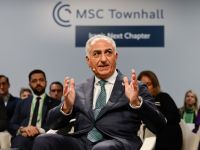Talks will be held between top leaders next week aimed at reactivating the stalled Cabinet formation process, more than a week after Prime Minister-designate Mustapha Adib stepped down, throwing the crises-ridden country into paralysis and uncertainty, political sources said Sunday.
President Michel Aoun is set to confer with Parliament Speaker Nabih Berri on the Cabinet impasse during their joint flight to Kuwait Monday to offer condolences to Kuwaiti officials on the passing of the late emir, Sheikh Sabah al-Ahmad al-Sabah, who died last Tuesday at the age of 91 after ruling the Gulf state for 14 years. Caretaker Prime Minister Hassan Diab will be on the same flight to offer condolences.
“Depending on the outcome of his talks with Berri, President Aoun will either decide to set a date for binding consultations with parliamentary blocs to appoint a new prime minister, or opt to confer first with blocs to reach a consensus beforehand on a new premier before setting a date for the binding consultations,” a political source familiar with the matter told The Daily Star.
The source said that Aoun had given rival factions more than a week since Adib’s resignation to assess the situation and decide on their choice for the next prime minister.
Given the mounting political, economic and financial challenges facing the country as it reels from multiple crises, the source said calls for the formation of a techno-political government are gaining ground instead of a small 14-member Cabinet of non-partisan experts that had been planned by Adib to deliver reforms badly needed to unlock promised international aid to steer the country out of its worst economic and financial crunch since the 1975-90 Civil War.
“A techno-political Cabinet appears to be vital so that it can grapple with major challenges, including implementing reforms and conducting negotiations with Israel on the maritime border demarcation,” the source said.
Berri Thursday announced that a framework has been agreed upon to begin indirect US-mediated talks with Israel on land and maritime border demarcation, which will be led by the Lebanese Army.
Former Prime Minister Najib Mikati was reported to have proposed the formation of a techno-political Cabinet as a means to end the weekslong standoff. The proposal called for forming a 20-member Cabinet comprising 14 independent specialists and six politicians to serve as state ministers, representing the country’s six major sects.
But the formation of a techno-political government will run counter to the French initiative to save Lebanon.
“Mikati’s proposal is stillborn. It will not serve at all as a possible breakthrough in the Cabinet deadlock,” former Prime Minister Fouad Siniora told The Daily Star Thursday. “There is no solution except the French initiative that called for forming a small government of non-partisan specialists to enact reforms.”
Tripoli MP Nicolas Nahhas, a member of Mikati’s parliamentary bloc, said Mikati’s proposal aimed at achieving a breakthrough in the Cabinet stalemate, “after it turned out that it was difficult to separate politics from the economy and this led to the failure of Adib’s mission.”
“We have entered complete collapse. What is required is the formation of a government comprising politicians and specialists as soon as possible,” Nahhas told a local radio station Sunday. He said the proposal for a techno-political government would be put up for discussion after the return of Aoun and Berri from Kuwait.
Siniora along with Mikati and former premiers Saad Hariri and Tammam Salam had nominated Adib, Lebanon’s ambassador in Berlin, to form a new government after Diab’s Cabinet resigned on Aug. 10, a few days after the deadly explosion that pulverized Beirut Port. The Aug. 4 blast damaged half of the capital, killed at least 192 people, injured thousands, left 300,000 people homeless and caused losses worth billions of dollars.
With Hariri having declared he will not be the next prime minister, the four ex-premiers will have to choose a new candidate for the premiership. Media reports said the four ex-premiers might this time choose one of them as the next prime minister.
Berri said Saturday a new Cabinet was essential to save the country facing an economic meltdown, a collapsing currency that has lost more than 80 percent of its value against the US dollar since last October, putting half of the population under the poverty line, an addition to an increasingly alarming spike in coronavirus infections that prompted authorities to place 111 towns and villages across the country under weeklong lockdown that went into effect Sunday morning.
He said the main challenge in Lebanon was to agree on a new candidate to take on the premiership. “The main challenge now is to reach an agreement on the name of the prime minister. It will be easy then to agree on other matters and steps under the ceiling of the [French] initiative,” Berri said in an interview with Al-Mayadeen channel Saturday.
The Amal Movement leader renewed his commitment to the French initiative, which aimed at putting Lebanon on a path of reforms that would eventually lead to necessary financial assistance vital to shoring up the crumbling economy, burdened by a soaring public debt of over $90 billion.
Berri said the framework deal for the maritime and land border demarcation with Israel is a “necessary step but is not enough.”
“It must be accompanied with the formation of a government as soon as possible, a government that is able to rescue the country from its crises and implement what was in the framework deal, nothing more, nothing less,” he added.
Berri and Hezbollah had been largely blamed for stalling Adib’s Cabinet formation efforts. Adib stepped aside on Sept. 26 less than a month after his designation after his attempts to form a small 14-member Cabinet of non-partisan specialists to implement key reforms hit snags on insistence by the two main Shiite groups, the Amal Movement and Hezbollah, on retaining hold of the Finance Ministry. The two groups also insisted on naming Shiite members of the new Cabinet, which ran contrary to Adib’s intention to select members of his Cabinet by himself.
Despite Adib’s resignation, French President Emmanuel Macron has declared that the French initiative to rescue Lebanon from a series of multiple crises was still in force, vowing not to let the Lebanese down.
In a press conference in Paris Sept. 27, a day after Adib’s resignation, Macron accused Lebanon’s political leaders of “collective betrayal” over their failure to form a new government, but he gave them another four to six weeks to implement a road map proposed by France to bring the country back from the verge of chaos.
Under the French road map presented by Macron to Lebanon’s political leaders during his visit to Beirut Sept. 1, the new government would carry out reforms and take measures to fight endemic corruption, curb waste of public funds and overhaul the country’s ailing electricity sector, which drains the cash-strapped state Treasury around $2 billion annually.
Macron, who in August organized a UN-backed donor conference for Lebanon following the port blast, has said that he will organize a second donor conference in October if the new “mission government” rapidly presses through a slew of key reforms contained in his road map.
This article has been adapted from its original source.








